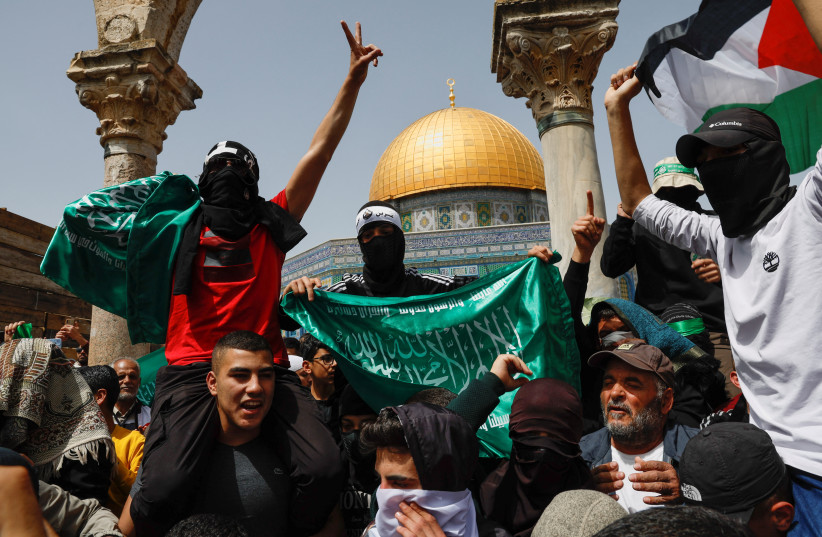The tremendous necessity to reach a ceasefire in Gaza is again being raised under the shadow of the approaching Muslim holy month of Ramadan, which is expected to begin on the evening of March 10. Senior Israeli security officers have warned against enforcing draconian measures that will vastly deny Muslims coming from within Israel or the West Bank the freedom to pray at al-Aqsa Mosque within the Temple Mount/Haram al-Sharif compound in Jerusalem's Old City.
For more stories from The Media Line go to themedialine.org
Al-Aqsa Mosque and Temple Mount/Haram al-Sharif compound stand at the focal point of the Arab-Israeli conflict because of their religious status in Islam and Judaism. The conflict has driven both sides toward what could potentially turn into a religious war between an estimated 16 million Jews worldwide and close to 2 billion Muslims. Who on earth would instigate a conflict of this magnitude?
Israel, the Palestinian leadership, and the Islamic Waqf (endowment) must take careful and well-calculated measures to ensure that freedom of worship for Muslims will be honored at their third-holiest shrine. At the same time, law, and order should be maintained at al-Aqsa Mosque compound for the entire duration of prayer services throughout the month of Ramadan and, preferably, thereafter.
Keeping Israeli security forces, including police and border guards, outside the walls of al-Aqsa Mosque and the larger plaza will undermine every motive of Palestinian worshippers to demonstrate. No Israeli police on-site or in sight will mean no provocation to the Palestinians. In contrast, the nonstop storming of the mosque plaza by Jewish zealots driven by Ben Gvir's extreme right-wing motives would severely undermine any attempt to maintain quiet within the Temple Mount/Haram al-Sharif compound.
The Islamic Waqf (endowment), whose job is to keep law, order, and quiet in al-Aqsa Mosque, must do as much as they can to prevent the entrance of known subversive elements whose main goal is not to pray but to cause unrest. A joint committee from Palestine, Jordan, and Israel is probably what the mosque needs to make sure that its sanctity is honored by all parties.

Let’s not deny that fanatic extremists on both sides help each other. The job of those who still have functioning brains in their heads is to work together and stop parties from manipulating and using the third holiest shrine in Islam for political purposes and to prevent unrest in the mosque from being exploited to aggravate the war in Gaza. Pressure is being exerted on Israel to speed up a cease-fire agreement in Gaza before the start of Ramadan.
Washington is concerned that the conflict might include other elements, such as Lebanon if fighting continues until the holiday.
Both sides will win from ceasefire
Whether it is a humanitarian ceasefire or any other kind, the two parties that will win the most from a ceasefire are the Israeli captives held in Gaza and close to 1.4 million displaced Palestinians who have been concentrated in Rafah on the border with Egypt.
The needs of these two essential components of the conflict should be addressed immediately instead of being passed off between Israel, Egypt, Qatar, France, and the US. If not, then it would be better to save travel expenses and let the fate of the war victims on both sides rest in God’s hands.
Every deal involves a quid pro quo, where each side gives something and gets something in return. A deal to release the Israeli captives in exchange for Palestinian prisoners held in Israel is fair enough. A ceasefire in Gaza and increasing humanitarian aid to the beleaguered Palestinians is also fair enough. All parties involved can agree on these two parameters and eventually have time and space to prepare for the post-truce period.
Israeli Prime Minister Benjamin Netanyahu has been ignoring international calls for a ceasefire, instead remaining committed to the zero-sum path of continuing the war until Hamas is defeated. There is room to suggest that he really couldn't care less about the fate of the Israeli captives in Gaza or the hundreds if not thousands of Palestinians who will likely lose their lives in this war in Gaza.
Victory cannot define the outcome of the current war. Both sides have paid heavily and will pay even more the longer this war continues. In his book The Art of War, Sun Tzu wrote: “The greatest victory is that which requires no battle.” As such, the mutual victory that both sides can achieve for themselves will be the one reached at the negotiation table under international auspices. The US has repeatedly failed over the past three decades to manage the conflict rather than solve it.
International intervention is needed to provide adequate guarantees for the Palestinians and the Israelis so that their peacemaking efforts will inevitably yield the longed-for two-state solution. Regardless of how much this solution is endorsed or contested by either party, it is the only doable solution for the Middle East.
Elias Zananiri is a former career journalist and a policy adviser to the PLO.
